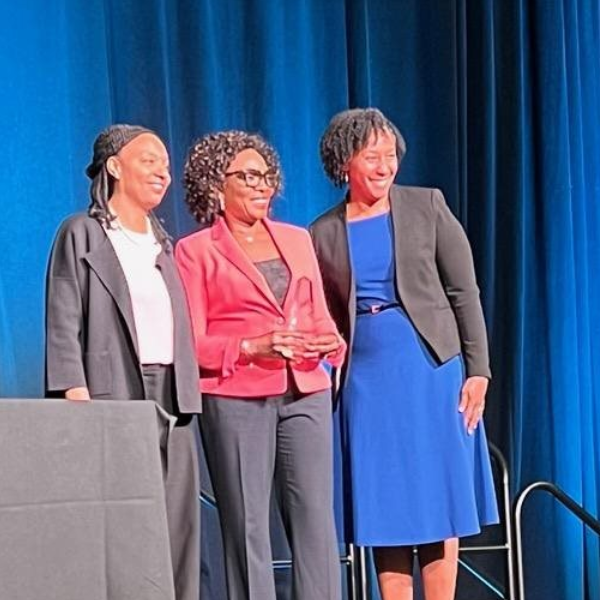
July 28, 2023
Childhood Inspiration Leads to Commitment to Sustainable Development Goals
 As a child in Nigeria, Ade Olomu wondered why any time her mother took her to a medical clinic, she usually had to wait several hours for care.
As a child in Nigeria, Ade Olomu wondered why any time her mother took her to a medical clinic, she usually had to wait several hours for care.
“One day I asked my mother, ‘Why do we have to spend the whole day waiting to see a doctor?’” she recalled. “I was 6 years old.”
At that young age, she vowed she would become a doctor, and, as an adult, she has dedicated her career to encouraging others, particularly minorities, that they can become physicians too.
Recognized for Commitment to Sustainable Development Goals
 Olomu, MD, chief of the College of Human Medicine’s Division of General Internal Medicine, recently received the Society of Internal Medicine’s 2023 Herbert W. Nickens Award. The Society gives the annual award to those who have “demonstrated exceptional commitment to cultural diversity in medicine or to improving minority health.”
Olomu, MD, chief of the College of Human Medicine’s Division of General Internal Medicine, recently received the Society of Internal Medicine’s 2023 Herbert W. Nickens Award. The Society gives the annual award to those who have “demonstrated exceptional commitment to cultural diversity in medicine or to improving minority health.”
Olomu, the Blanch B. and Frederick C. Swartz Endowed Professor of Medicine, has done both. Among her many activities, she partnered with the Ingham County Health Department to create a program to improve cardiovascular care for minorities and low-income populations. For years, she has encouraged minority students to apply to medical programs, and she has mentored them through medical school.
“It gives them the opportunity to see that they can do it,” Olomu said. “There is nothing that should scare them away.”
Overcoming Challenges and Inspiring Others
As a high school student in Nigeria, she often was told that the challenges were too great, particularly for a girl, to join a profession dominated by men. Her father, an engineer, encouraged her to follow her dream.
Olomu earned her medical degree from the University of Benin in Nigeria, a fellowship in England, and a residency in internal medicine at MSU.
She joined the College of Human Medicine faculty in 2000 and was named Chief of the Division of General Internal Medicine in 2020.
Over the years, she has dedicated much of her time to increasing cultural diversity in the college, in her own research, and in medical practice.
“Ultimately your brilliance and fortitude has fostered a sphere of influence that has changed not only your home institution,” Shani Scott, MD, chair of the awards committee wrote, “but has far reaching impact nationally…”
Improving Care through Sustainable Development Goals
Attracting more minority students to medical school and, eventually, to medical practice is a key to improving care for a diverse population, Olomu said.
“Patients do better when they see doctors who look like them,” she said, adding that the effort has been worth it, and going the extra mile for patients has been time well spent.
“You will always find time to do what is important,” Olomu said. “I consider it important to encourage more students to go into medicine. Yes, I’m very busy, but this is number one, to encourage improved health care for minority populations.”
View more College of Human Medicine news
SDGs, Targets, and Indicators
-
SDG 3: Good Health and Well-being
- Target 3.2: By 2030, end preventable deaths of newborns and children under 5 years of age
- Indicator 3.2.1: Under-five mortality rate
The article discusses Ade Olomu’s dedication to improving cardiovascular care for minorities and low-income populations. By addressing healthcare disparities and encouraging minority students to pursue medical careers, Olomu contributes to the goal of achieving good health and well-being for all.
-
SDG 4: Quality Education
- Target 4.3: By 2030, ensure equal access for all women and men to affordable and quality technical, vocational, and tertiary education, including university
- Indicator 4.3.1: Participation rate of youth and adults in formal and non-formal education and training in the previous 12 months
The article highlights Olomu’s efforts to encourage minority students to apply to medical programs and mentor them through medical school. By promoting equal access to quality education for aspiring physicians, Olomu contributes to the goal of achieving quality education for all.
-
SDG 5: Gender Equality
- Target 5.5: Ensure women’s full and effective participation and equal opportunities for leadership at all levels of decision-making in political, economic, and public life
- Indicator 5.5.1: Proportion of seats held by women in national parliaments and local governments
The article mentions that Olomu was encouraged by her father to pursue her dream of becoming a doctor, despite being told that the challenges were too great for a girl. Her journey and achievements contribute to the goal of achieving gender equality and empowering women.
-
SDG 10: Reduced Inequalities
- Target 10.2: By 2030, empower and promote the social, economic, and political inclusion of all, irrespective of age, sex, disability, race, ethnicity, origin, religion, or economic or other status
- Indicator 10.2.1: Proportion of people living below 50 percent of median income, by age, sex, and persons with disabilities
Olomu’s work to increase cultural diversity in the medical field and improve healthcare for minority populations contributes to the goal of reducing inequalities and promoting inclusion for all individuals, regardless of their background or status.
Table: SDGs, Targets, and Indicators
| SDGs | Targets | Indicators |
|---|---|---|
| SDG 3: Good Health and Well-being | Target 3.2: By 2030, end preventable deaths of newborns and children under 5 years of age | Indicator 3.2.1: Under-five mortality rate |
| SDG 4: Quality Education | Target 4.3: By 2030, ensure equal access for all women and men to affordable and quality technical, vocational, and tertiary education, including university | Indicator 4.3.1: Participation rate of youth and adults in formal and non-formal education and training in the previous 12 months |
| SDG 5: Gender Equality | Target 5.5: Ensure women’s full and effective participation and equal opportunities for leadership at all levels of decision-making in political, economic, and public life | Indicator 5.5.1: Proportion of seats held by women in national parliaments and local governments |
| SDG 10: Reduced Inequalities | Target 10.2: By 2030, empower and promote the social, economic, and political inclusion of all, irrespective of age, sex, disability, race, ethnicity, origin, religion, or economic or other status | Indicator 10.2.1: Proportion of people living below 50 percent of median income, by age, sex, and persons with disabilities |
Behold! This splendid article springs forth from the wellspring of knowledge, shaped by a wondrous proprietary AI technology that delved into a vast ocean of data, illuminating the path towards the Sustainable Development Goals. Remember that all rights are reserved by SDG Investors LLC, empowering us to champion progress together.
Source: humanmedicine.msu.edu

Join us, as fellow seekers of change, on a transformative journey at https://sdgtalks.ai/welcome, where you can become a member and actively contribute to shaping a brighter future.






